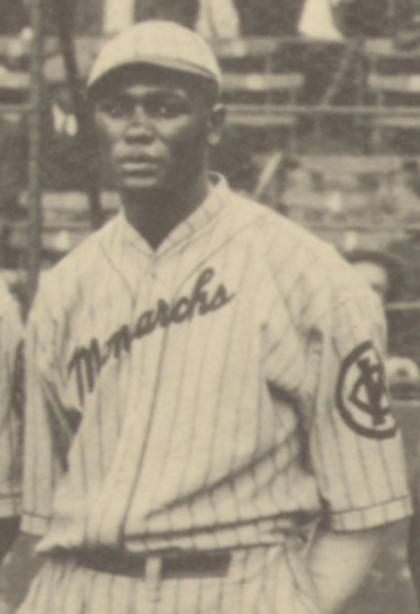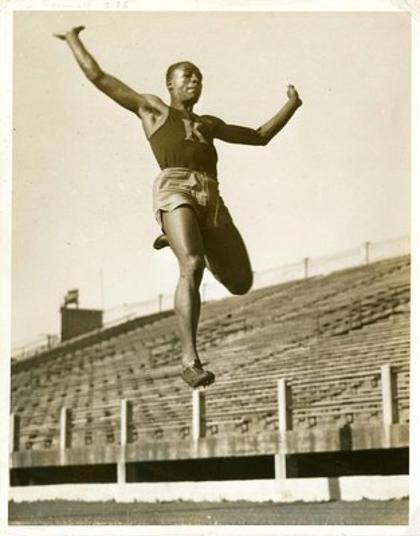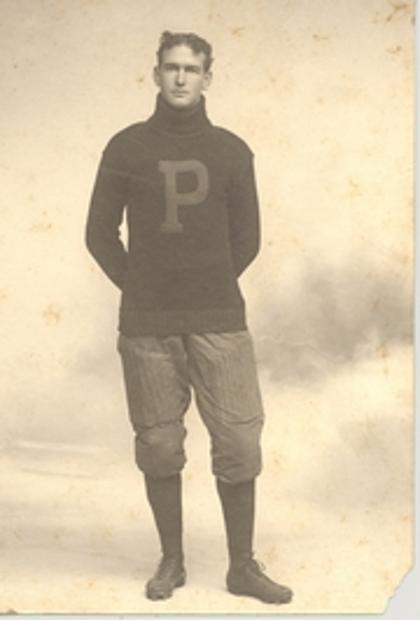Both inducted into statewide halls of fame.
Both inducted into the PSU Athletics Hall of Fame.
And now, both part of an exhibit this month at the Bicknell Family Center for the Arts.
Here, their stories:

George Sweatt
Sweatt was the first Black student athlete to letter in four sports, and the first regular player to appear in each of the first four Negro League World Series.
A native of Humboldt, Kansas, he came to Pittsburg State in 1920 after serving in the U.S. Army’s all-black 816th Pioneer Infantry Division in France during World War I.
He earned a teacher’s certificate and became the first Black athlete to letter in football, basketball, and track. He was a standout sprinter and set the school record in the shot put.
After graduating in 1922, he taught physical education at a segregated school in Coffeyville and began a seven-year professional baseball career in the Negro National League.
For four years, he played with the Kansas City Monarchs and for three years, the Chicago American Giants, appearing in the first four Negro World Series and helping the Giants to World Series titles in 1926 and 1927.
Following his baseball career, he worked for the U.S. Postal Service until his retirement in 1957 and remained active in coaching and youth organizations until his death in 1983.
In 1983, George A. Sweatt Park was dedicated in Humboldt in his memory, and an historical marker was erected by the City of Humboldt and the Humboldt Museum in 2003.
He was inducted into the Kansas Baseball Hall of Fame in 2011 and the Kansas Sports Hall of Fame in 2016.

Kermit King
King never lost a long jump competition in 30 meets, and never lost an event in dual or conference meets, where he won 11 consecutive individual titles.
Born and raised in New York City, he came to Kansas in 1933 to attend school at what was then called Kansas State Teachers College of Pittsburg.
He just missed qualifying for the 1936 Olympic Team — by a fraction of an inch — when the sixth and final jump by a competitor knocked him from a qualifying position.
As the USA champion, he ranked second in the world behind Jesse Owens in 1937.
King also won the NCAA title in 1937 — the year he earned his bachelor’s degree. He also captured AAU and Pan American titles, and in fact was one of the first Black men to compete (and win) in the state of Texas at the 1937 Pan American Games. He still holds the long jump record of 25-10 ½ at Pittsburg State.
After making his mark as an athlete, he earned his master’s degree from Pittsburg State in 1938, his doctorate from UCLA in 1947, and went on to a distinguished international career in higher education.
King worked as a professor of education at West Virginia State College from 1947-1952, and Tennessee A&I University from 1952-54, then went on to hold administrative positions at universities in Africa, Southeast Asia, Central America, and South America, before finishing his career at the U.S. Department of State.
In 2002, just a year before his death, he was inducted in the Kansas Sports Hall of Fame.
The Office of Alumni Relations awarded him the Meritorious Achievement Award posthumously in 2003, and his papers and memorabilia are housed in PSU Special Collections in Axe Library.

Others
The exhibit includes photographs of other early PSU athletes, teams, and influential coaches, including a photograph of Garfield “Doc” Weede, one of the first college coaches to break with tradition and encourage racial integration among his players.
He was hired in 1919 as the coach of all sports and the director of athletics at what was then called the Pittsburg Manual Training Normal School, and in 1924 his team was declared Kansas Collegiate Athletic Conference champions. He was inducted into the Kansas Sports Hall of Fame, and today, the Garfield Weede Building — home to PSU Athletics — bears his name.
The exhibit also includes illustrations and team posters by legendary athletics artist Ted Watts, a PSU alumnus and Southeast Kansas native.
It was curated by Bicknell Center Client Services Coordinator Shawna Witherspoon and Special Collections Director Steve Cox.
The exhibit can be seen Monday through Friday during business hours, or when the Bicknell Center is open for evening and weekend events.